In-Person and Online Studies Examining the Influence of Problem Solving on the Fading Affect Bias
Abstract
1. Introduction
1.1. Problem Solving and Emotions
1.2. The Fading Affect Bias (FAB)
2. The Current Study
2.1. Study 1: In Person
2.1.1. Method
Participants
Materials and Measures
Procedure
Analytic Strategy
2.1.2. Results
Discrete Two-Way Interactions
Continuous Two-Way Interactions
Continuous Three-Way Interactions
Examining Rehearsals as Mediators of the Three-Way Interactions
2.1.3. Discussion
2.2. Study 2: Online Replication
2.2.1. Method
Participants
Materials and Measures
Procedure and Analytic Strategy
2.2.2. Results
Discrete Two-Way Interactions
Continuous Two-Way Interactions
Continuous Three-Way Interactions
Only Thinking Rehearsals Mediated Two Three-Way Interactions
2.2.3. Discussion
3. General Discussion
Author Contributions
Funding
Institutional Review Board Statement
Informed Consent Statement
Data Availability Statement
Acknowledgments
Conflicts of Interest
References
- Thoits, P.A. Stressors and problem-solving: The individual as psychological activist. J. Health Soc. Behav. 1994, 35, 143–160. [Google Scholar] [CrossRef] [PubMed]
- Fredrickson, B.L.; Branigan, C. Positive emotions broaden the scope of attention and thought-action repertoires. Cogn. Emot. 2005, 19, 313–332. [Google Scholar] [CrossRef] [PubMed]
- Lehman, B.A.; D’Mello, S.K.; Person, N. All Alone with Your Emotions: An Analysis of Student Emotions during Effortful Problem Solving Activities. ResearchGate. 2008. Available online: https://www.researchgate.net/publication/228630627_All_Alone_with_your_Emotions_an_analysis_of_student_emotions_during_effortful_problem_solving_activities (accessed on 11 July 2024).
- Walker, W.R.; Vogl, R.J.; Thompson, C.P. Autobiographical memory: Unpleasantness fades faster than pleasantness over time. Appl. Cogn. Psychol. 1997, 11, 399–413. [Google Scholar] [CrossRef]
- Walker, W.R.; Skowronski, J.J.; Thompson, C.P. Life is pleasant—And memory helps to keep it that way! Rev. Gen. Psychol. 2003, 7, 203–210. [Google Scholar] [CrossRef]
- Näveri, L.; Pehkonen, E.; Hannula, M.S.; Laine, A.; Heinilä, L. Finnish elementary teachers’ espoused beliefs on mathematical problem-solving. In Current State of Research on Mathematical Beliefs XVII, Proceedings of the MAVI-17 Conference, Ruhr-Universität Bochum, Germany, 17–20 September 2011; Rösken, B., Casper, M., Eds.; University of Bochum: Bochum, Germany, 2011; pp. 161–171. [Google Scholar]
- Hannula, M.S. Emotions in problem solving. In Selected Regular Lectures from the 12th International Congress on Mathematical Education; Springer International Publishing: Cham, Switzerland, 2015; pp. 269–288. [Google Scholar]
- Isen, A.M. Some ways in which positive affect influences decision-making and problem-solving. Handb. Emot. 2008, 3, 548–573. [Google Scholar]
- Isen, A.M.; Daubman, K.A.; Nowicki, G.P. Positive affect facilitates creative problem-solving. J. Personal. Soc. Psychol. 1987, 52, 1122–1131. [Google Scholar] [CrossRef]
- Nelson, D.W.; Sim, E.K. Positive affect facilitates social problem solving. J. Appl. Soc. Psychol. 2014, 44, 635–642. [Google Scholar] [CrossRef]
- Llera, S.J.; Newman, M.G. Worry impairs the problem-solving process: Results from an experimental study. Behav. Res. Ther. 2020, 135, 103759. [Google Scholar] [CrossRef]
- Marx, E.M.; Schulze, C.C. Interpersonal problem-solving in depressed students. J. Clin. Psychol. 1991, 47, 361–367. [Google Scholar] [CrossRef]
- Falkenstein, C.; Kolb, M.; Stubenvoll, A. Entwicklung eines diagnostischen Inventars zur Erfassung der Problemlösefähigkeit bei depressiven Studenten. Z. Klin. Psychol. 1983, 12, 12–30. [Google Scholar]
- Korkmaz, S.; Keleş, D.D.; Kazgan, A.; Baykara, S.; Gürok, M.G.; Demir, C.F.; Atmaca, M. Emotional intelligence and problem-solving skills in individuals who attempted suicide. J. Clin. Neurosci. 2020, 74, 120–123. [Google Scholar] [CrossRef] [PubMed]
- Walker, W.R.; Skowronski, J.J.; Gibbons, J.A.; Vogl, R.J.; Thompson, C.P. On the emotions that accompany autobiographical memories: Dysphoria disrupts the fading affect bias. Cogn. Emot. 2003, 17, 703–723. [Google Scholar] [CrossRef]
- Jersild, A. Memory for the pleasant as compared with the unpleasant. J. Exp. Psychol. 1931, 14, 284–288. [Google Scholar] [CrossRef]
- Meltzer, H. Individual differences in forgetting pleasant and unpleasant experiences. J. Educ. Psychol. 1930, 21, 399–409. [Google Scholar] [CrossRef]
- Meltzer, H. Sex differences in forgetting pleasant and unpleasant experiences. J. Abnorm. Soc. Psychol. 1931, 25, 450–464. [Google Scholar] [CrossRef]
- Watters, R.; Leeper, R. The relation of affective tone to the retention of experiences in everyday life. J. Exp. Psychol. 1936, 19, 203–215. [Google Scholar] [CrossRef]
- Cason, H. The learning and retention of pleasant and unpleasant activities. Arch. Psychol. 1932, 134, 1–96. Available online: https://archive.org/details/archivesofpsych134wooduoft/page/96/mode/2up (accessed on 11 July 2024).
- Holmes, D.S. Differential change in affective intensity and the forgetting of unpleasant personal experiences. J. Personal. Soc. Psychol. 1970, 15, 234–239. [Google Scholar] [CrossRef]
- Taylor, S.E. Asymmetrical effects of positive and negative events: The mobilization-minimization hypothesis. Psychol. Bull. 1991, 110, 67–85. [Google Scholar] [CrossRef]
- Gibbons, J.; Lee, S.; Walker, W. The fading affect bias begins within 12 hours and persists for 3 months. Appl. Cogn. Psychol. 2011, 25, 663–672. [Google Scholar] [CrossRef]
- Rollins, L.; Gibbons, J.A.; Cloude, E.B. Affective change greater for unpleasant than pleasant events in autobiographical memory of children and adults: A retrospective study. Cogn. Dev. 2018, 47, 46–52. [Google Scholar] [CrossRef]
- Gibbons, J.A.; Rollins, L. Rehearsal and event age predict the fading affect bias across young adults and elderly in self-defining and everyday autobiographical memories. Exp. Aging Res. 2021, 47, 232–261. [Google Scholar] [CrossRef] [PubMed]
- Gibbons, J.A.; Toscano, A.; Kofron, S.; Rothwell, C.; Lee, S.A.; Ritchie, T.D.; Walker, W.R. The fading affect bias across alcohol consumption frequency for alcohol-related and non-alcohol-related events. Conscious. Cogn. 2013, 22, 1340–1351. [Google Scholar] [CrossRef] [PubMed]
- Gibbons, J.A.; Hartzler, J.K.; Hartzler, A.W.; Lee, S.A.; Walker, W.R. The Fading Affect Bias shows healthy coping at the general level, but not the specific level for religious variables across religious and non-religious events. Conscious. Cogn. 2015, 36, 265–276. [Google Scholar] [CrossRef] [PubMed]
- Gibbons, J.A.; Harris, K.D.; Friedmann, E.D.; Pappalardo, E.A.; Rocha, G.R.; Traversa, M.J.; Nolan, M.J.; Lee, S.A. Coronaphobia flips the emotional world upside down: Unhealthy variables positively predict the fading affect bias at high physical symptoms of coronavirus anxiety. Appl. Cogn. Psychol. 2023, 38, e4144. [Google Scholar] [CrossRef]
- Muir, K.; Brown, C. The COVID-19 pandemic disrupted the healthy fading of emotions in autobiographical memory mediated via in-person social disclosures. Appl. Cogn. Psychol. 2024, 38, e4149. [Google Scholar] [CrossRef]
- Gibbons, J.A.; Horowitz, K.A.; Dunlap, S.M. The fading affect bias shows positive outcomes at the general but not the individual level of analysis in the context of social media. Conscious Cogn. 2017, 53, 47–60. [Google Scholar] [CrossRef]
- Gibbons, J.A.; Bouldin, B. Videogame play and events are related to unhealthy emotion regulation in the form of low fading affect bias in autobiographical memory. Conscious. Cogn. Int. J. 2019, 74, 102778. [Google Scholar] [CrossRef]
- Gibbons, J.; Dunlap, S.; LeRoy, S.; Thomas, T. Conservatism positively predicted fading affect bias in the 2016 US presidential election at low, but not high, levels of negative affect. Appl. Cogn. Psychol. 2020, 35, e3741. [Google Scholar] [CrossRef]
- Walker, W.R.; Alexander, H.; Aune, K. Higher levels of grit are associated with a stronger fading affect bias. Psychol. Rep. 2020, 123, 124–140. [Google Scholar] [CrossRef]
- Ritchie, T.D.; Skowronski, J.J.; Wood, S.E.; Walker, W.R.; Vogl, R.J.; Gibbons, J.A. Event self-importance, event rehearsal, and the fading affect bias in autobiographical memory. Self Identity 2006, 5, 172–195. [Google Scholar] [CrossRef]
- Skowronski, J.; Gibbons, J.; Vogl, R.; Walker, W. The effect of social disclosure on the intensity of affect provoked by autobiographical memories. Self Identity 2004, 3, 285–309. [Google Scholar] [CrossRef]
- Walker, W.R.; Skowronski, J.J. The fading affect bias: But what the hell is it for? Appl. Cogn. Psychol. 2009, 23, 1122–1136. [Google Scholar] [CrossRef]
- Muir, K.; Brown, C.; Madill, A. The fading affect bias: Effects of social disclosure to an interactive versus non-responsive listener. Memory 2015, 23, 829–847. [Google Scholar] [CrossRef] [PubMed]
- Muir, K.; Brown, C.; Madill, A. Conversational patterns and listener responses associated with an enhanced fading affect bias after social disclosure. J. Lang. Soc. Psychol. 2019, 38, 552–585. [Google Scholar] [CrossRef]
- Gibbons, J.A.; Fehr, A.M.; Brantley, J.C.; Wilson, K.J.; Lee, S.A.; Walker, W.R. Testing the fading affect bias for healthy coping in the context of death. Death Stud. 2016, 40, 513–527. [Google Scholar] [CrossRef]
- Gibbons, J.A.; Dunlap, S.M.; Horowitz, K.; Wilson, K. A fading affect bias first: Specific healthy coping with partner-esteem for romantic relationship and non-relationship events. Int. J. Environ. Res. Public Health 2021, 18, 10121. [Google Scholar] [CrossRef]
- Zengel, B.; Lee, E.M.; Walker, W.R.; Skowronski, J.J. Romantic relationships and fading of affect for memories of the shared past. Appl. Cogn. Psychol. 2019, 33, 861–872. [Google Scholar] [CrossRef]
- Ritchie, T.; Skowronski, J.; Hartnett, J.; Wells, B.; Walker, W. The fading affect bias in the context of emotion activation level, mood, and personal theories of emotion change. Memory 2009, 17, 428–444. [Google Scholar] [CrossRef]
- Gibbons, J.A.; Lee, S.A. Rehearsal partially mediates the negative relations of the fading affect bias with depression, anxiety, and stress. Appl. Cogn. Psychol. 2019, 33, 693–701. [Google Scholar] [CrossRef]
- Walker, W.R.; Yancu, C.N.; Skowronski, J.J. Trait anxiety reduces affective fading for both positive and negative autobiographical memories. Adv. Cogn. Psychol. 2014, 10, 81–89. [Google Scholar] [CrossRef] [PubMed]
- Gibbons, J.; Lee, S.; Fehr, A.; Wilson, K.; Marshall, T. Grief and avoidant death attitudes combine to predict the fading affect bias. Int. J. Environ. Res. Public Health 2018, 15, 1736. [Google Scholar] [CrossRef] [PubMed]
- Ritchie, T.D.; Kitsch, K.S.; Dromey, M.; Skowronski, J.J. Individuals who report eating disorder symptoms also exhibit a disrupted fading affect bias in autobiographical memory. Memory 2019, 27, 239–249. [Google Scholar] [CrossRef] [PubMed]
- Crouch, J.L.; Skowronski, J.J.; Davilla, A.L.; Milner, J.S. Does the fading affect bias vary by memory type and a parent’s risk of physically abusing a child? A replication and extension. Psychol. Rep. 2022, 37, 2418–2432. [Google Scholar] [CrossRef]
- Skowronski, J.J.; Crouch, J.L.; Coley, S.L.; Sasson, S.; Wagner, M.F.; Rutledge, E.; Cote, K.; Miksys, C.; Milner, J.S. Fading of affect associated with negative child-related memories varies by parental child abuse potential. Appl. Cogn. Psychol. 2016, 30, 972–982. [Google Scholar] [CrossRef]
- Pillersdorf, D.; Scoboria, A. Cannabis-associated impairments in the fading affect bias and autobiographical memory specificity. Conscious. Cogn. 2019, 74, 102792. [Google Scholar] [CrossRef]
- Gibbons, J.A.; Lee, S.A.; Fernandez, L.P.; Friedmann, E.D.; Harris, K.D.; Brown, H.E.; Prohaska, R.D. The fading affect bias (FAB) is strongest for Jews and Buddhists and weakest for participants without religious affiliations: An exploratory analysis. World J. Adv. Res. Rev. 2021, 9, 350–362. [Google Scholar] [CrossRef]
- Ritchie, T.; Skowronski, J.; Cadogan, S.; Sedikides, C. Affective responses to self-defining autobiographical events. Self Identity 2014, 13, 513–534. [Google Scholar] [CrossRef]
- Sedikides, C.; Alicke, M.D. The five pillars of self-enhancement and self-protection. In The Oxford Handbook of Human Motivation; Ryan, R.M., Ed.; Oxford University Press: Oxford, UK, 2019; pp. 307–319. [Google Scholar]
- American Psychological Association. Ethical Principles of Psychologists and Code of Conduct (2002, Amended Effective 1 June 2010, and 1 January 2017). 2017. Available online: http://www.apa.org/ethics/code/index.html (accessed on 11 July 2024).
- Saucier, G. Mini-Markers: A brief version of Goldberg’s unipolar Big-Five Markers. J. Personal. Assess. 1994, 63, 506–516. [Google Scholar] [CrossRef]
- Watson, D.; Clark, L.; Tellegen, A. Development and validation of brief measures of positive and negative affect: The PANAS scales. J. Personal. Soc. Psychol. 1988, 54, 1063–1070. [Google Scholar] [CrossRef]
- Lovibond, S.H.; Lovibond, P.F. Manual for the Depression, Anxiety & Stress Scales; Psychology Foundation: Washington, DC, USA, 1995. [Google Scholar] [CrossRef]
- Buysse, D.J.; Reynolds, C.F.; Monk, T.H.; Berman, S.R.; Kupfer, D.J. The Pittsburgh Sleep Quality Index: A new instrument for psychiatric practice and research. Psychiatry Res. 1989, 28, 193–213. [Google Scholar] [CrossRef] [PubMed]
- Schutte, N.S.; Malouff, J.M.; Hall, L.E.; Haggerty, D.J.; Cooper, J.T.; Golden, C.J.; Dornheim, L. Development and validation of a measure of emotional intelligence. Personal. Individ. Differ. 1998, 25, 167–177. [Google Scholar] [CrossRef]
- Tsai, H.S. Development of an inventory of problem-solving abilities of tertiary students majoring in engineering technology. World Trans. Eng. Technol. Educ. 2010, 8, 268–272. [Google Scholar]
- Duckworth, A.L.; Quinn, P.D. Development and validation of the Short Grit Scale (GRIT–S). J. Personal. Assess. 2009, 91, 166–174. [Google Scholar] [CrossRef]
- Hayes, A.F. Introduction to Mediation, Moderation, and Conditional Process Analysis: A Regression-Based Approach; Guilford Press: New York, NY, USA, 2022. [Google Scholar]
- Preacher, K.J.; Curran, P.J.; Bauer, D.J. Computational tools for probing interactions in multiple linear regression, multilevel modeling, and latent curve analysis. J. Educ. Behav. Stat. 2006, 31, 437–448. [Google Scholar] [CrossRef]
- Statistics Solutions. The Assumption of Homogeneity of Variance. 2018. Available online: https://www.statisticssolutions.com/ (accessed on 10 July 2023).





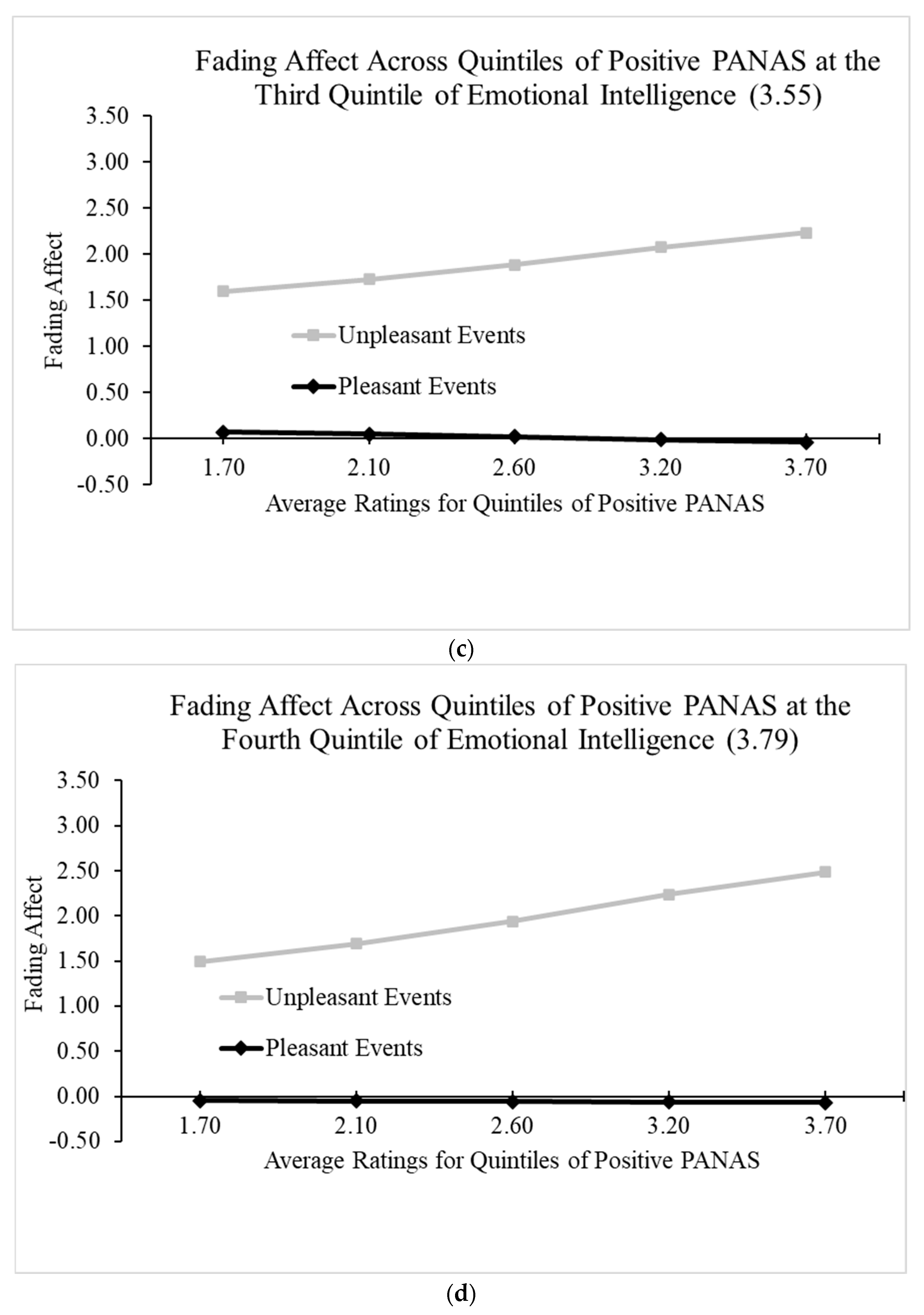
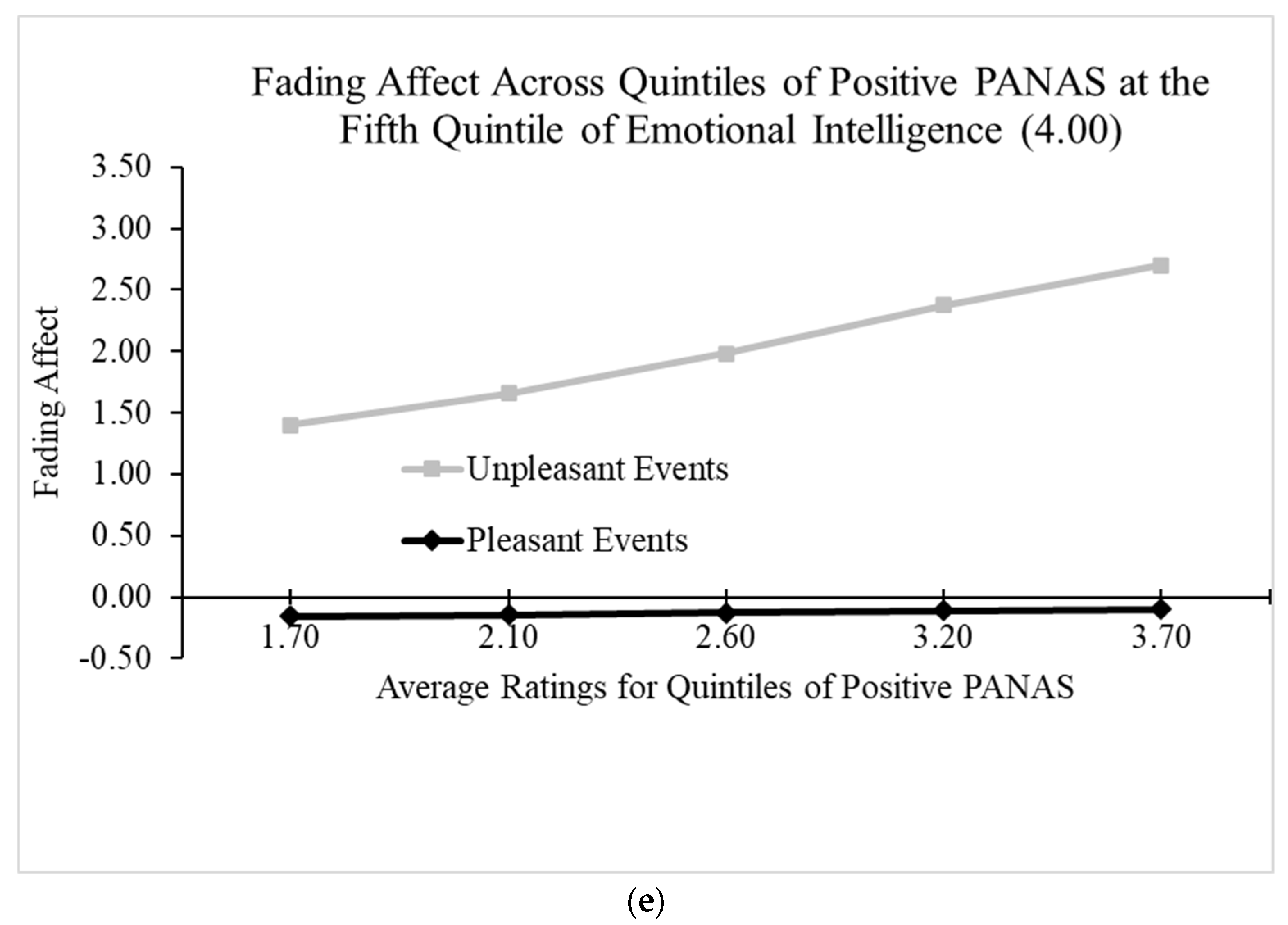

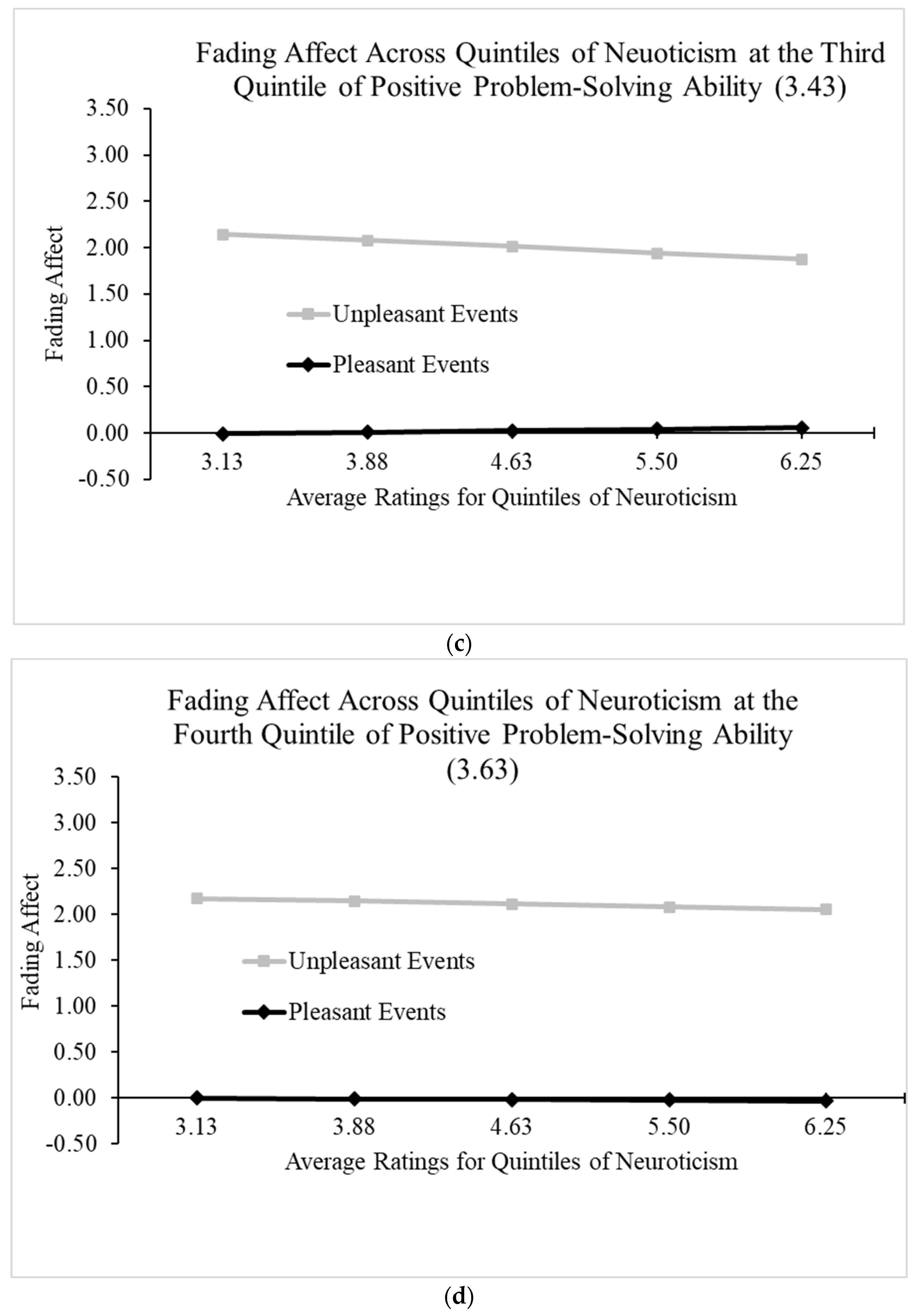

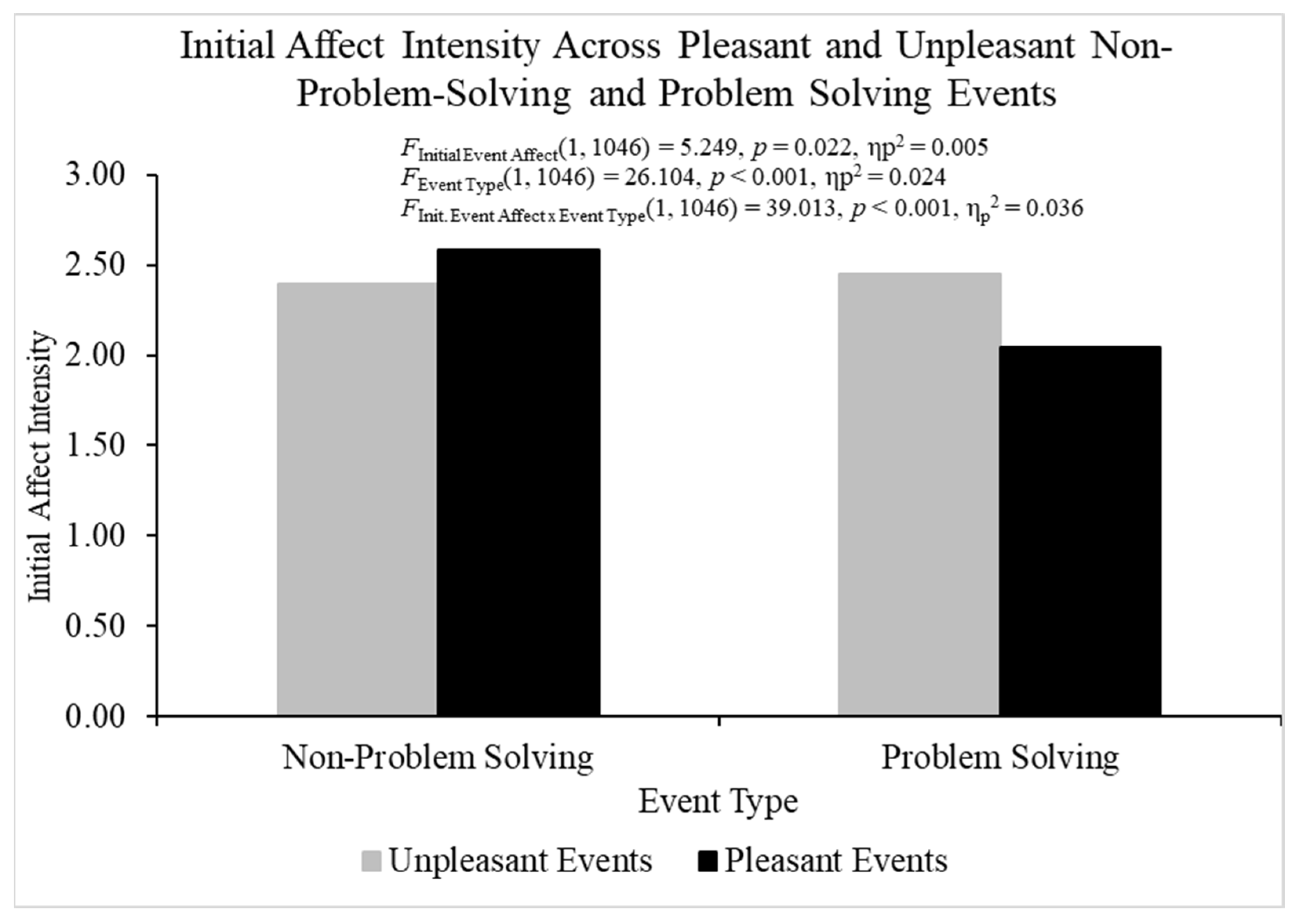
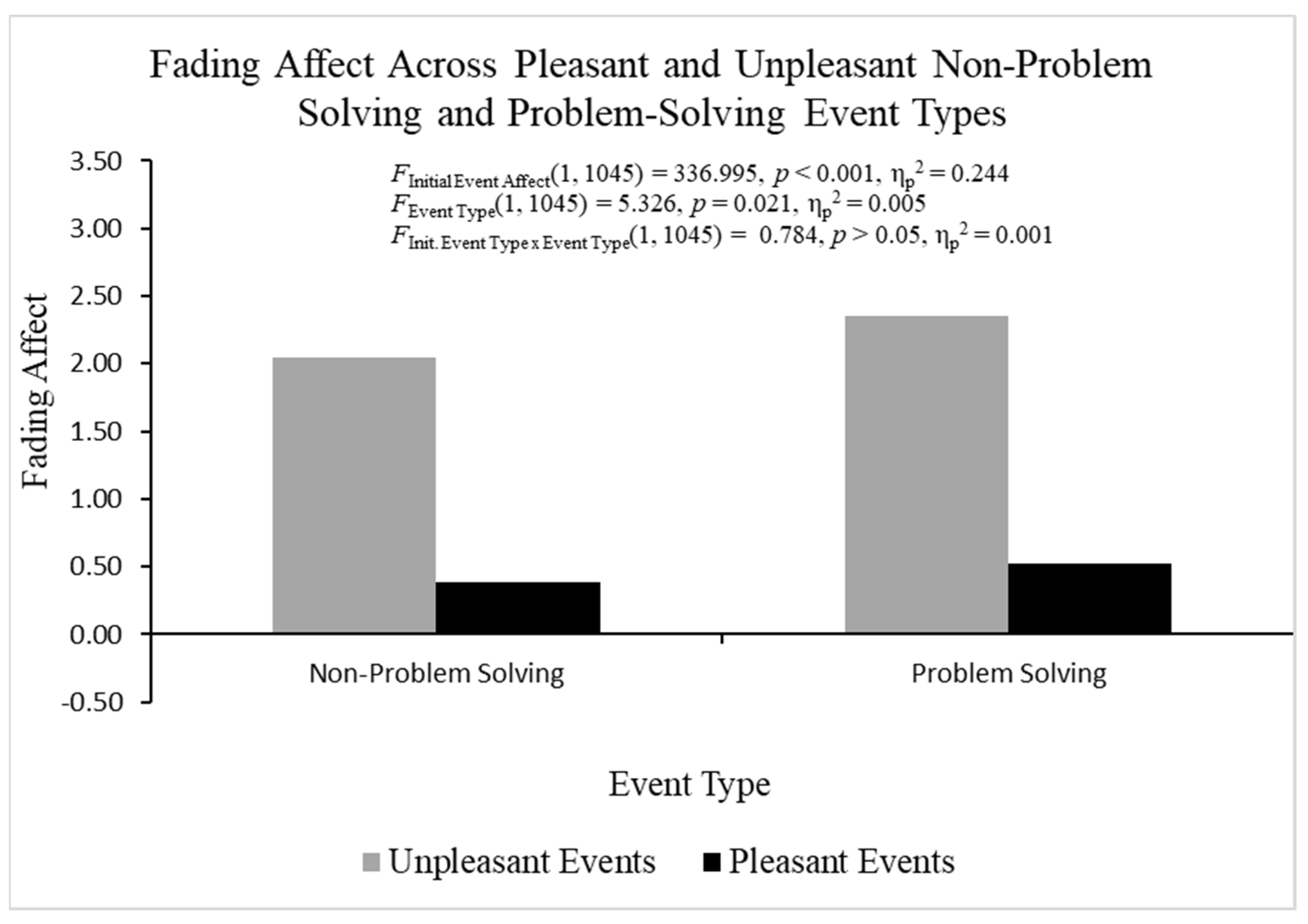
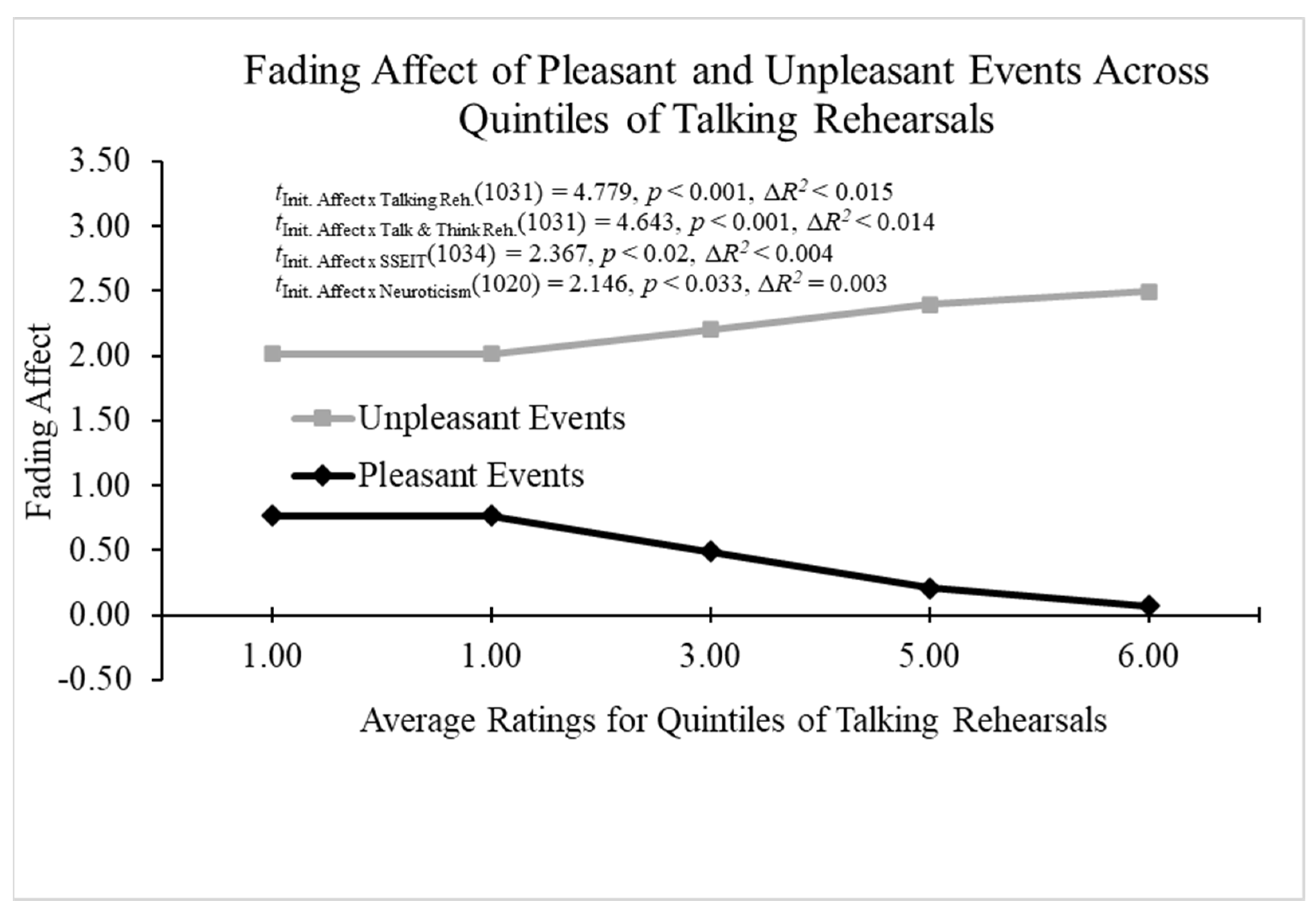
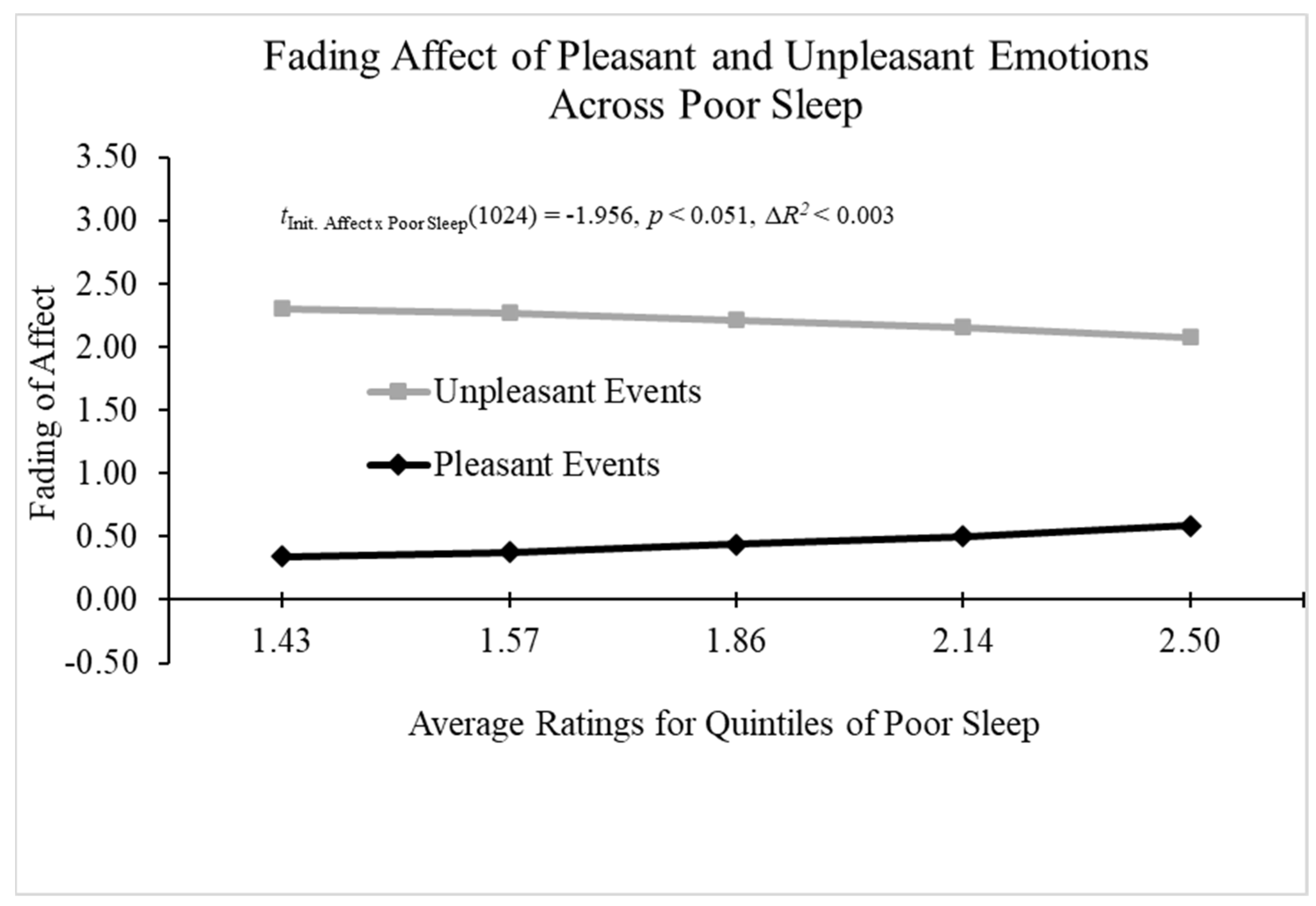


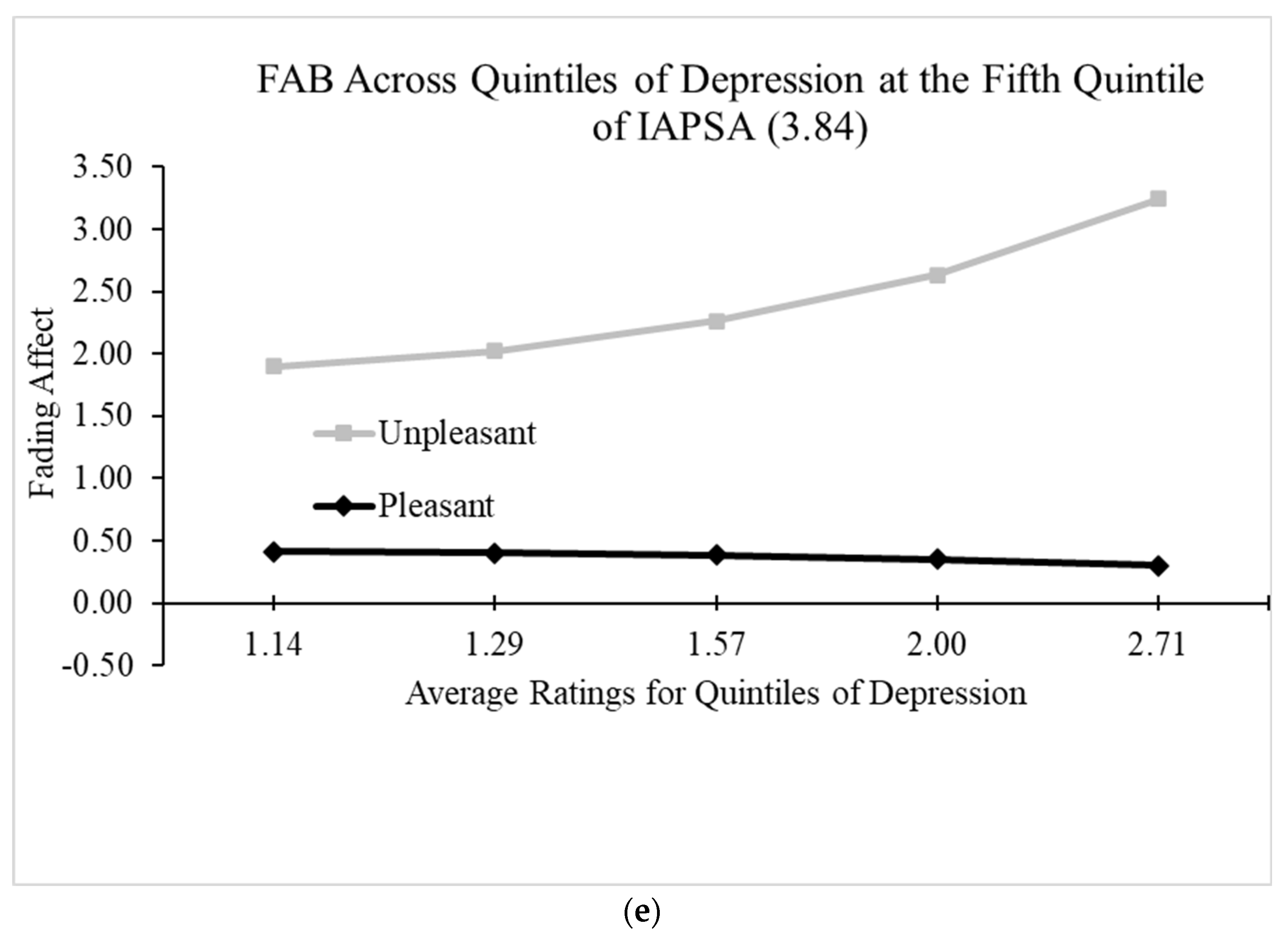
Disclaimer/Publisher’s Note: The statements, opinions and data contained in all publications are solely those of the individual author(s) and contributor(s) and not of MDPI and/or the editor(s). MDPI and/or the editor(s) disclaim responsibility for any injury to people or property resulting from any ideas, methods, instructions or products referred to in the content. |
© 2024 by the authors. Licensee MDPI, Basel, Switzerland. This article is an open access article distributed under the terms and conditions of the Creative Commons Attribution (CC BY) license (https://creativecommons.org/licenses/by/4.0/).
Share and Cite
Gibbons, J.A.; Vandevender, S.; Langhorne, K.; Peterson, E.; Buchanan, A. In-Person and Online Studies Examining the Influence of Problem Solving on the Fading Affect Bias. Behav. Sci. 2024, 14, 806. https://doi.org/10.3390/bs14090806
Gibbons JA, Vandevender S, Langhorne K, Peterson E, Buchanan A. In-Person and Online Studies Examining the Influence of Problem Solving on the Fading Affect Bias. Behavioral Sciences. 2024; 14(9):806. https://doi.org/10.3390/bs14090806
Chicago/Turabian StyleGibbons, Jeffrey Alan, Sevrin Vandevender, Krystal Langhorne, Emily Peterson, and Aimee Buchanan. 2024. "In-Person and Online Studies Examining the Influence of Problem Solving on the Fading Affect Bias" Behavioral Sciences 14, no. 9: 806. https://doi.org/10.3390/bs14090806
APA StyleGibbons, J. A., Vandevender, S., Langhorne, K., Peterson, E., & Buchanan, A. (2024). In-Person and Online Studies Examining the Influence of Problem Solving on the Fading Affect Bias. Behavioral Sciences, 14(9), 806. https://doi.org/10.3390/bs14090806






